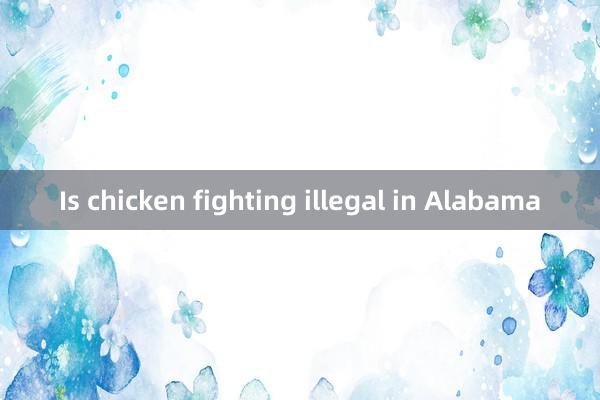Is cockfighting legal anywhere in the philippines

Is Cockfighting Legal Anywhere in the Philippines?
Cockfighting, or "sabong," has a long and complex history in the Philippines, deeply rooted in the country's culture and traditions. For centuries, it has been considered a popular form of entertainment and even a cultural practice that gathers communities together. However, the legality of cockfighting in the Philippines is not as straightforward as one might think. In recent years, the rules surrounding this activity have shifted, and there are important legal and moral debates about whether cockfighting should still be allowed in modern society. So, is cockfighting legal anywhere in the Philippines today? Let's take a closer look.
Historical and Cultural Background of Cockfighting
Cockfighting in the Philippines dates back to before Spanish colonization. As part of Filipino culture, cockfights are typically held in arenas known as "cockpits," and these events often take place during festivals or significant community gatherings. It is not just a sport but also a form of gambling, where spectators place bets on which rooster they believe will win the match. Sabong has even found its way into popular media, with many Filipinos growing up with the image of cockfighting as a traditional pastime.
During the Spanish period, cockfighting was not only tolerated but regulated by colonial authorities. The revenues generated from cockpits were used to fund local projects and government expenses. Over time, cockfighting became even more entrenched in Filipino society.
The Legal Framework of Cockfighting in the Philippines
In terms of legality, cockfighting is not universally allowed throughout the country. The Philippine government has created a framework for regulating it, making it legal only under specific circumstances and locations. The Cockfighting Law of 1974, also known as Presidential Decree No. 449, is the primary legislation governing this activity.
Under this law, cockfighting is allowed, but only in licensed cockpits and during specific times of the year. It is generally permitted during local fiestas or celebrations, which are held in different municipalities and cities across the country. Additionally, the law allows for cockfighting to take place during certain special holidays, such as the annual Cockers’ Congress, a national event that gathers breeders and enthusiasts from across the country. However, outside of these permitted events, hosting or participating in illegal cockfights, known locally as "tupada", is punishable by law.
Restrictions and Recent Developments
go88 thiên đườngIn recent years, several changes have affected the status of cockfighting in the Philippines. With the growing popularity of e-sabong, or online cockfighting, the Philippine government has faced new challenges in regulating this traditional activity. E-sabong gained widespread attention during the COVID-19 pandemic when physical cockpits were temporarily closed due to health restrictions. As a result, many turned to digital platforms to continue participating in the sport and placing bets.
However, the rise of e-sabong has sparked controversy, leading to stricter government intervention. In May 2022, former President Rodrigo Duterte ordered the suspension of e-sabong operations, citing concerns about its social impact. Reports of gambling addiction and crimes related to e-sabong raised alarms, prompting the government to take decisive action. While traditional cockfighting remains legal under regulated conditions, the future of online cockfighting remains uncertain, with debates ongoing about how to best address the moral and social implications of the sport in its new digital form.
Ethical and Moral Considerations
While legal in many parts of the Philippines, cockfighting faces criticism from animal rights advocates. Organizations like the Philippine Animal Welfare Society (PAWS) and other international groups condemn the sport, arguing that it promotes cruelty towards animals. Roosters are bred specifically for fighting and are often equipped with sharp blades, called gaffs, that increase the likelihood of fatal injuries. These practices have sparked debates over whether cockfighting should be abolished altogether, with many calling for stronger animal protection laws.
Despite these criticisms, proponents of cockfighting argue that it is part of the nation's cultural heritage. Many communities, especially in rural areas, see cockfighting as a long-standing tradition that provides entertainment and economic opportunities. Cockfighting also supports a local economy of breeders, farmers, and small businesses that depend on the industry for their livelihoods.
Conclusion
So, is cockfighting legal anywhere in the Philippines? The answer is yes, but only in certain conditions. Traditional cockfighting, governed by Presidential Decree No. 449, is still legal in licensed cockpits during specific local events and holidays. However, unauthorized cockfighting, or tupada, is illegal and punishable by law. The rise of e-sabong has complicated the landscape, leading to stricter regulations and a halt on online cockfighting platforms.
As the country continues to grapple with the ethical, social, and legal aspects of cockfighting, it remains to be seen how this centuries-old tradition will evolve in the future. The ongoing debates highlight the tension between preserving cultural practices and addressing modern concerns, particularly regarding animal welfare and the potential negative impacts of gambling.
Jili games online real moneywww.sgshand.com













